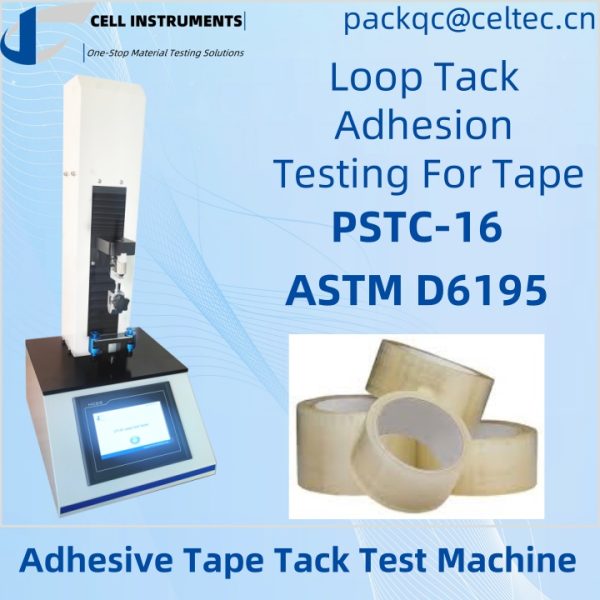Understanding Adhesive Tape Tack Test Machines: Ensuring Quality with Loop Tack Adhesion Testing for Tape
Introduction
Adhesive tapes are essential in various industries, from packaging to medical applications. Ensuring their performance relies on accurate testing, and the adhesive tape tack test machine plays a vital role in this process. By measuring the adhesive’s tackiness, or initial stickiness, manufacturers can maintain product quality and meet industry standards. This article delves into the importance of adhesive tack testing, focusing on loop tack adhesion testing for tape, its industry applications, and how to select the right equipment for your needs.
What is an Adhesive Tape Tack Test Machine?
An adhesive tape tack test machine is designed to evaluate the tackiness of pressure-sensitive adhesives, such as tapes and labels. Tack refers to the adhesive’s ability to bond quickly to a surface with minimal pressure. This characteristic is crucial in determining the initial adhesion strength, especially for applications where fast bonding is required, such as in packaging or medical tapes.
Why is Loop Tack Adhesion Testing for Tape Important?
The loop tack adhesion testing for tape method, standardized by ASTM D6195, ensures that adhesive products adhere effectively under specific conditions. The loop tack test involves creating a loop of adhesive tape, bringing it into contact with a substrate, and measuring the force required to separate it. This method is widely used in industries where reliability and quick adhesion are critical, such as:
- Packaging: Ensures tapes used for sealing packages maintain integrity during transit.
- Medical Devices: Confirms that tapes and adhesives used in medical dressings and devices securely adhere to the skin without causing discomfort.
- Pharmaceuticals: Validates adhesive patches, such as transdermal drug delivery systems, ensuring they stay attached for the required duration.
Key Features of an Adhesive Tape Tack Test Machine
When selecting a tack test machine, it’s essential to look for features that provide precision, accuracy, and ease of use. Cell Instruments’ Loop Tack Tester is a high-quality option designed for various industries. Its advanced sensors ensure that even small variations in tack are detected, making it ideal for quality control.
- Precision and Accuracy: Equipped with high-precision sensors, the machine delivers consistent and reliable measurements, detecting minor changes in adhesive performance.
- User-Friendly Interface: The control panel is intuitive, allowing easy setup and execution of tests.
- Versatility: Suitable for different adhesive materials, it can handle a range of products, from simple packaging tapes to complex medical adhesives.
- Customization Options: Tailored solutions for specific industry needs are available, ensuring optimal performance for every application.
The Importance of ASTM D6195 Compliance
Adhering to ASTM D6195 ensures consistency in testing across various laboratories and industries. The standard outlines the process for performing loop tack adhesion testing:
- Sample Preparation: Cut a strip of adhesive tape, ensuring it’s free of contaminants.
- Loop Formation: Form the tape into a loop with the adhesive side out.
- Testing: Place the loop on a substrate under controlled speed and pressure, then measure the force required to detach it.
- Results Interpretation: The tack force is recorded and compared against industry benchmarks or product specifications.
Following this standard improves the reliability of test results and ensures compliance with industry norms, which is essential for product development and quality control.
How Adhesive Tape Tack Test Machines Enhance Product Quality
Testing the tackiness of adhesives helps manufacturers maintain high product standards, ensuring that tapes and labels adhere properly in their intended applications. In industries like packaging and pharmaceuticals, this is especially critical, as even slight failures in adhesive performance can lead to product damage, contamination, or regulatory non-compliance.
- Improved R&D: The detailed data gathered from tack testing informs research and development, allowing manufacturers to enhance adhesive formulations.
- Cost Savings: Consistent testing reduces material waste and ensures that only high-performing adhesives are used in production, optimizing costs.
Why Choose Cell Instruments for Tack Testing?
Cell Instruments offers a wide range of testing equipment, including the Loop Tack Tester, which meets the rigorous requirements of industries like packaging, medical, and pharmaceuticals. Its precision, versatility, and adherence to ASTM D6195 make it a reliable choice for ensuring adhesive performance.
FAQ
1. What is tack testing, and why is it important?
Tack testing measures the initial adhesive strength of tapes and labels. It’s crucial for ensuring that products bond quickly and securely, especially in fast-paced industries like packaging and medical devices.
2. How does loop tack adhesion testing work?
In loop tack adhesion testing, a loop of adhesive tape is formed and brought into contact with a substrate. The force required to separate the loop from the substrate is measured, giving a value for the adhesive’s tackiness.
3. What industries use adhesive tack testing?
Industries such as packaging, medical devices, pharmaceuticals, and adhesives use tack testing to ensure product quality and performance.
4. Why is ASTM D6195 important in tack testing?
ASTM D6195 provides a standardized method for loop tack testing, ensuring consistency and accuracy across different laboratories and industries.
5. How can Cell Instruments’ Loop Tack Tester improve my adhesive products?
Cell Instruments’ Loop Tack Tester provides precise, repeatable measurements, helping you ensure that your adhesives meet industry standards, reduce waste, and optimize product development.

